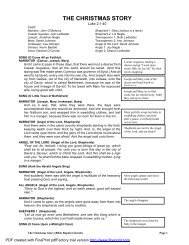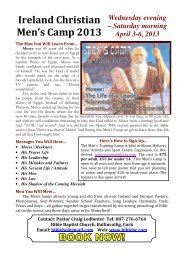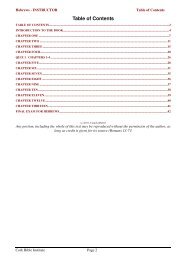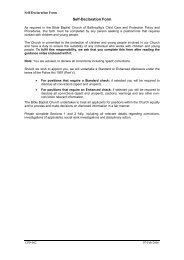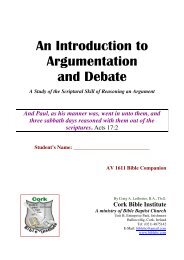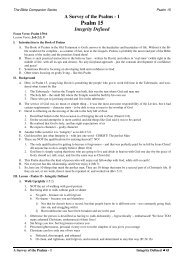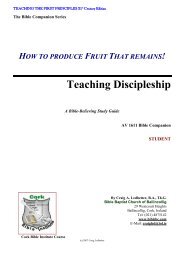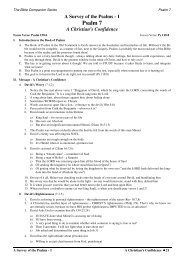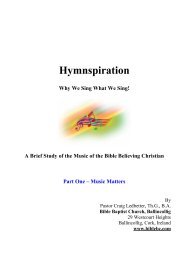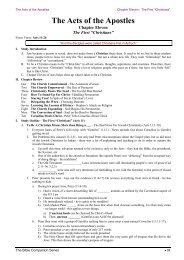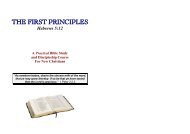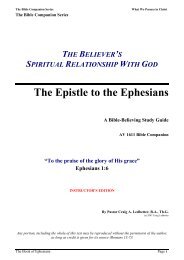Old Testament Survey - Student.pdf - Bible Baptist Church of Blarney
Old Testament Survey - Student.pdf - Bible Baptist Church of Blarney
Old Testament Survey - Student.pdf - Bible Baptist Church of Blarney
You also want an ePaper? Increase the reach of your titles
YUMPU automatically turns print PDFs into web optimized ePapers that Google loves.
<strong>Old</strong> <strong>Testament</strong> <strong>Survey</strong> – <strong>Student</strong> Edition<br />
Job, Psalms, Proverbs<br />
Psalms<br />
Author: Most people automatically think <strong>of</strong> _________ when they consider the question <strong>of</strong> who<br />
wrote the Book <strong>of</strong> Psalms. A shepherd boy who rose to become the most famous king <strong>of</strong> Judah, he<br />
was also known as "the sweet psalmist <strong>of</strong> Israel" (2 Samuel 23:1). He lived during the most creative<br />
age <strong>of</strong> Hebrew song and poetry. As king, he organized the services <strong>of</strong> worship in the tabernacle,<br />
appointing priests and Levites for the specific purpose <strong>of</strong> providing songs and music. So it is not<br />
surprising that his name should be clearly associated with this beautiful book <strong>of</strong> praise.<br />
The brief descriptions that introduce the psalms have David listed as author in 73 instances. David's<br />
personality and identity are clearly stamped on many <strong>of</strong> these psalms. While it is clear that David<br />
wrote many <strong>of</strong> the individual psalms, he is definitely not the author <strong>of</strong> the entire collection. Two <strong>of</strong><br />
the psalms (72) and (127) are attributed to Solomon, David's son and successor. Psalm 90 and 91 are<br />
prayers by Moses. Another group <strong>of</strong> 12 psalms (50) and (73—83) is ascribed to the family <strong>of</strong> Asaph.<br />
The sons <strong>of</strong> Korah wrote 11 psalms (42,44-49,84-85,87-88). Psalm 88 is attributed to Heman, while<br />
(89) is assigned to Ethan the Ezrahite. With the exception <strong>of</strong> Solomon and Moses, all these additional<br />
authors were priests or Levites who were responsible for providing music for sanctuary worship<br />
during David's reign. Fifty <strong>of</strong> the psalms designate no specific person as author.<br />
Date <strong>of</strong> Writing: A careful examination <strong>of</strong> the authorship question, as well as the subject matter<br />
covered by the psalms themselves, reveal they span a period <strong>of</strong> many centuries. The oldest psalm in<br />
the collection is probably the prayers <strong>of</strong> Moses (90, 91), a reflection on the frailty <strong>of</strong> man as compared<br />
to the eternity <strong>of</strong> God. The latest psalm is probably (137), a song <strong>of</strong> lament clearly written during the<br />
days when the Hebrews were being held captive by the Babylonians, from about 586 to 538 B.C.<br />
It is clear that the 150 individual psalms were written by many different people across a period <strong>of</strong> a<br />
thousand years in Israel's history. They must have been compiled and put together in their present<br />
form by some unknown editor shortly after the Captivity ended about 537 B.C.<br />
The Purpose <strong>of</strong> Writing: With 150 individual psalms, the Book <strong>of</strong> Psalms is clearly the longest in<br />
the <strong>Bible</strong>. It is also one <strong>of</strong> the most diverse, since the psalms deal with such subjects as God and His<br />
creation, war, worship, wisdom, sin and evil, judgment, justice, and the coming <strong>of</strong> the Messiah.<br />
These individual psalms were clearly inspired by God's Spirit. Through these hymns <strong>of</strong> praise, we<br />
come face to face with our Maker and Redeemer. In the glory <strong>of</strong> His presence, we are compelled to<br />
exclaim along with the psalmist, "O LORD our Lord, how excellent is thy name in all the earth!"<br />
(Psalm 8:9). The Book contains much about sorrow, and joy – about Christ’s first and second coming<br />
– about the Tribulation and the Millennium.<br />
Just a Few Key Verses: Psalms 23:1; Psalms 51:10; Psalm 150:6<br />
Brief Summary: The Book <strong>of</strong> Psalms is a collection <strong>of</strong> prayers, poems, and hymns that focus the<br />
worshiper's thoughts on God in praise and adoration. Parts <strong>of</strong> this Book were used as a hymnal in the<br />
worship services <strong>of</strong> ancient Israel. The musical heritage <strong>of</strong> the psalms is demonstrated by its title. It<br />
comes from a Greek word which means "a song sung to the accompaniment <strong>of</strong> a musical instrument."<br />
In the original Hebrew manuscripts, this long collection <strong>of</strong> 150 psalms was divided into five sections:<br />
Book 1 (1-41), Book 2 (42-72), Book 3 (73-89), Book 4 (90-106), and Book 5 (107-150). Each <strong>of</strong><br />
these major sections closes with a brief prayer <strong>of</strong> praise.<br />
Practical Application: The result <strong>of</strong> being filled with the Spirit or the word <strong>of</strong> Christ is singing<br />
Psalms! The psalms were the “songbook” <strong>of</strong> the early church. The hymns are the songs <strong>of</strong> the church<br />
that reflected the new truth in Christ.<br />
We may think <strong>of</strong> the psalms as a description <strong>of</strong> our human response to God. At times God is presented<br />
in all His majesty and glory. Our response is wonder, awe, and fear (Psalm 68:32). But other psalms<br />
portray God as a loving Lord who is involved in our lives. Our response in these cases is to draw close<br />
to His comfort and security: "I will fear no evil; for thou art with me" (Psalm 23:4).<br />
God is the same Lord in both these psalms. But we respond to Him in different ways, according to the<br />
specific needs <strong>of</strong> our lives. What a marvellous God we worship, the psalmist declares-- One who is<br />
CBI - Practical Doctrine Page 70




